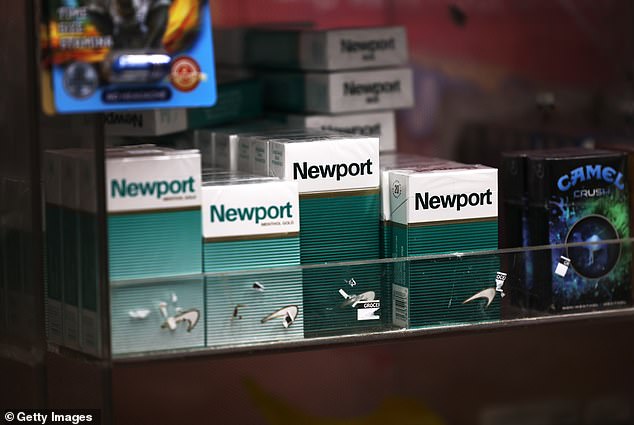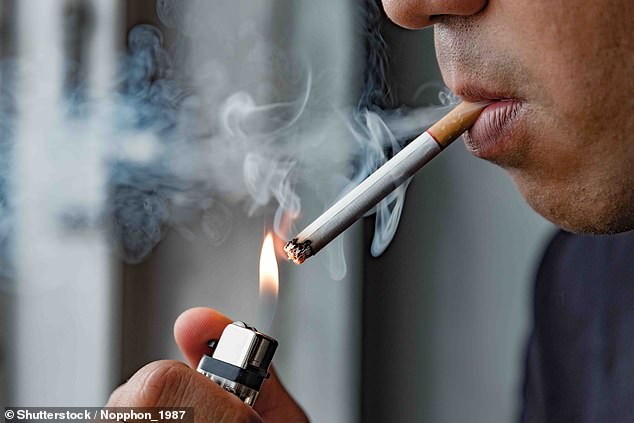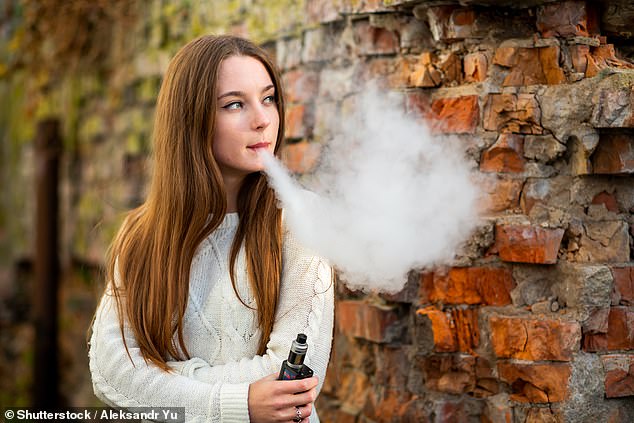The Food and Drug Administration (FDA) plans to ban the use of menthol cigarettes in America, a move that has been called for by anti-tobacco groups, anti-teen smoking groups and racial justice groups in America.
The move had been expected since the start of the Biden administration last year, when the president made it a priority to address the upward trend in teen smoking.
Menthol cigarettes — often colloquially called just “menthol” — are known for their minty taste and have been linked to higher rates of smoking and smoking-related illnesses among black Americans in recent decades.
Flavored cigars, like cigarillos, should be banned. Both moves are part of the FDA's larger effort to crack down on flavored tobacco products, which are blamed for an increase in teen smoking.

The FDA is moving to ban menthol cigarettes because their minty flavor has made them popular in many black and youth communities
New FDA Commissioner Robert Califf previewed the announcement in congressional testimony, saying the proposal would reduce illness and death by helping smokers quit and preventing younger people from starting.
Menthol makes up more than a third of cigarettes sold in the United States, and the mint flavor is overwhelmingly preferred by black smokers and young people.
The FDA has tried several times to get rid of menthol, but has faced pushback from Big Tobacco, members of Congress and competing political interests under both Democratic and Republican administrations.
The agency was under legal pressure to make a decision after anti-smoking and civil rights groups sued the FDA for "unreasonably" delaying action on previous requests to ban menthol.
The cooling effect of menthol has been shown to mask the throat roughness of smoking, making it easier to start and harder to quit.
The FDA will also seek to ban menthol and dozens of overly sweet and fruity flavors from small cigars that are becoming increasingly popular among young people, particularly black teenagers.
The agency's proposals on both cigarettes and cigars will only be initial drafts. The FDA will accept comments before issuing final rules, which could then face years of legal challenges from tobacco companies.

The FDA's move is part of a larger effort by regulators to reduce tobacco and nicotine use in America, particularly among more vulnerable groups
Menthol is the only cigarette flavor that was not banned under the 2009 law that gave the FDA authority over tobacco products, an exemption negotiated by industry lobbyists. However, the law directed the agency to continue to weigh a ban.
The cigarettes were commonly associated with the Newport brand, the leading seller of menthol cigarettes in America.
RJ Reynolds Tobacco Company, which owns Newport, told DaailyMail.com in a statement: “We strongly believe there are more effective ways to reduce tobacco harm than banning menthol in cigarettes.
“Evidence from other markets, including Canada and the EU, where similar bans have been imposed, shows little impact on overall cigarette consumption.”
"The scientific evidence shows no difference in the health risks of menthol cigarettes compared to non-menthol cigarettes, nor does it demonstrate that menthol cigarettes adversely affect initiation, dependence, or cessation. As a result, we do not believe that the published science supports regulating menthol cigarettes differently than non-menthol cigarettes."
However, not all experts agree with these types of bans.
“We have to be careful how we implement flavor bans,” said Dr. Michael Steinberg of Rutgers University told DailyMail.com earlier this month.
He later added: "...we must respect people's freedom and choice about their personal health."
Flavored products, in particular, are often the target of regulations because they are easier to use as a gateway for non-smokers, as one of the main deterrents to tobacco use is taste.
It's especially important for younger smokers who use vape devices like a JUUL, a popular refillable nicotine device.
While you may not like the taste of nicotine, it's much easier to enjoy the fruity, flavorful flavors.
"[The bans last April] will help save lives, especially among those disproportionately affected by these deadly products," the FDA wrote in a statement last year.
“With these actions, the FDA will help significantly reduce youth intake and increase the chances of quitting smoking.”
Earlier this month, the agency also gained authority to regulate synthetic nicotine, closing a loophole that opened after the agency required all e-cigarette and e-cigarette manufacturers to pull products from shelves unless they received agency approval.

Last year, the FDA began a crackdown on flavored nicotine products, forcing any product wanting to be sold in America to first receive agency approval
Under the new rules, a company that wants to market a fruit- or mint-flavored refillable device must first receive approval from the FDA — which rejected hundreds of them.
Many companies get around these orders began to use synthetic forms of the drug in their devices to circumvent regulators.
The Centers for Disease Control and Prevention (CDC) also released a study last month that found more than 2.5 million U.S. students had used some type of tobacco product in 2021 — a definition that includes nicotine devices that do not disperse tobacco.
Officials reported that 80 percent of tobacco use came from disposable e-cigarettes and cartridge products — like a JUUL.
In the study, approximately 2.06 million high school students – 13 percent of the study population – and four percent of middle school students – 470,000 participants – reported “current” tobacco use.
For comparison, in 2020, the CDC reported that eight percent of high school students and three percent of middle school students were current tobacco users.

Tobacco and nicotine consumption among teenagers has increased in recent years, reversing years of downward trend
Students were also asked if they had ever used tobacco products in their lives, with 34 percent of high school students and 11 percent of middle school students reporting at least one use.
According to the CDC study, e-cigarette devices were most responsible for the increase in nicotine and tobacco use last year.
Of students who reported current smokers, 54 percent use a disposable e-cigarette and 29 percent reported using some type of refillable device — similar to a JUUL.
Opponents of these bans say they will encourage teenagers to use more harmful tobacco products like cigarettes instead of nicotine, which poses less risk.
"By badmouthing safer nicotine products like vaping, we will inadvertently encourage high schoolers to smoke instead, which will be a terrible outcome," Mark Oates, director of consumer advocacy group We Vape, told DailyMail.com in March.

 Suche
Suche
 Mein Konto
Mein Konto

